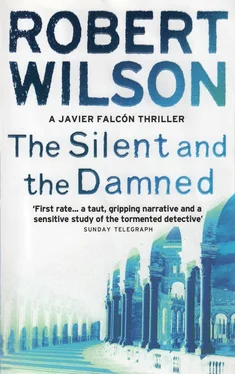Vega's -' Falcón stopped. 'I've just had a thought. I'll have to check it. Tell me what adjustment Montes made to his will.'
'He added a property to his assets,' said Ramírez. 'A small finca, worth less than three million pesetas.'
'I bet that made your heart leap for a moment.'
'I don't think I would have got the information so easily if it had been a 200-million-peseta villa in Marbella.'
'Did he say where it was?'
'He couldn't remember. He's going to look it up in the copy of the will and call me back.'
'Was there a mortgage on it?'
'He didn't know. He wasn't involved in the purchase of it.'
'When you've got an address for it, check out the deed and see if he ever talked about it to the people in his squad.'
The phone rang in the outer office. Ramírez took it, hunched over and scribbled furiously for a few minutes. He slammed the phone down, triumphant.
'We've got a result on Rafael Vega's ID trace,' he said. 'The first Rafael Vega died back in 1983 at the age of thirty-nine in a shipping accident in the port of La Coruna; the second one died from drinking acid last week.'
'How did he manage that?'
'The first time he died was just at the point when they were changing records from manual to computer. According to the computer records he was still alive. Only by going back to the old paper records did they find the death certificate.'
'He was the right age.'
'He was the right age, physically similar and he had no family. The original Rafael Vega was an orphan who became a merchant seaman. He never married.'
'So, not only was our Rafael Vega trained, but he was well connected in the clandestine world as well,' said Falcón. 'Finally we get the break, José Luis, but…'
'Yes, I know,' said Ramírez. 'He isn't who he says he is… but who the fuck is he?'
'There's an American connection. Krugman was sure he'd lived there and now we know he was getting mail sent to him from there,' said Falcón. 'And there's possibly a Mexican one.'
'The Mexican wife might just be another fake,' said Ramírez. 'It would be more plausible for a man of that age to have been married before.'
'He's looking to me as if he's Central or South American origin now.'
'If you were originally Argentinian, would you use a fake passport from your country of origin?'
'Maybe not, but that still leaves the rest of the subcontinent,' said Falcón. 'Perhaps we need to have a meeting with Juez Calderón. We're due one early this week. I think this classifies as a development.'
He put a call through to Calderón's secretary. The judge was just finishing a meeting. She would talk to him and see if there was a chance before lunch. After lunch was out of the question. Falcón hung up and sat back in his chair.
'What sort of people need the level of secrecy at which Rafael Vega was operating?' he asked.
'Someone who was a covert intelligence operative for a government or a terrorist organization,' said Ramírez. 'Someone involved in the drugs trade.'
'What about an arms dealer?' said Falcón. 'The Russian connection. Where's the easiest place to get military hardware?'
'Russia, via the mafia,' said Ramírez. 'And the money is coming from the building projects. Those land deals were done directly between the original owners and the Russians. No money trail to Vega.'
'Plausible, but that just gives us more questions. Who is he supplying and, before we let our imagination run completely wild,' said Falcón, 'why kill him?'
'A terrorist organization that doesn't want a lead to their door,' said Ramírez.
Calderón's secretary called back and said that he could see them in half an hour. They drove to the Edificio de los Juzgados and went straight up to Calderón's office. He was facing away from his desk, looking through the slats of the blinds, smoking. He heard them come in. He told them to sit.
'Case or no case?' he asked, without turning around.
'Complications,' said Falcón, and talked him through the secret life of Rafael Vega.
As Falcón spoke, Calderón turned in his chair. If the last time Falcón had seen him he'd looked as though he'd come back to the city after being lost in the mountains, now he looked as stricken as a man who'd had to eat his comrades in order to survive. He was haggard, the smudges beneath his eyes were now grape-dark and his forehead was stepped with furrows. He seemed to have lost weight. His neck did not fill his collar. Falcón finished. Calderón nodded, he seemed pensive but distracted. The new information did not galvanize his ambition.
'Well, you've got a bit more background information on Vega now,' he said, 'but you still haven't given me any real development in the case – no witness, no motive. What exactly do you want?'
'We could start with a search warrant for the safe- deposit box in the Banco Banesto,' said Ramírez, cutting in, exchanging a look with Falcón.
'Whose box is it?' asked Calderón.
'It's Vega's, of course,' said Ramírez, puzzled by the judge's lack of comprehension, 'but in the name of Emilio Cruz.'
'I'll work on it,' said Calderón. 'What else?'
'We have theories. We want more time,' said Falcón, and gave him the examples of the Russian mafia connection to military hardware, and the names of the men who all appeared to know each other from Vega's address book and Raúl Jiménez's photographs.
'That's all conjecture,' said Calderón. 'Where's the evidence? Vega has been running a successful construction business in Seville for nearly twenty years. He's built it more or less from scratch. So, he happens to run his business in a certain way and…'
'You seem to be forgetting that he's a man with perfect fake Spanish documents and an Argentinian alias with Moroccan visas for a quick getaway,' said Ramírez. 'I hardly think that level of secrecy would classify him as, say, a married man embarking on illicit affairs.'
Calderón shot him a look that whistled past his ear.
'I can see that,' said the judge. 'Obviously the man had a past. He's escaped from something and rebuilt his life. Maybe his past has caught up with him in some way, but that doesn't help you determine which direction you're going to take. You're talking about arms dealing, drug running, people-trafficking and terrorism, but you haven't shown me a lead that would indicate a direction. You've just got theories. The Russian land deals look odd, agreed. Their connection to Vega is unhealthy, to say the least. But we have no access to the original owner of the plots. You can look up the sale price on the deed, but that won't tell you much because everybody puts a low value on land sales for tax purposes. There has to be a chain of logic that the Juez Decano can see if public money is to be spent chasing these… notions.'
'You don't see any connection between Sr Vega's death and the suicide of his neighbour?' said Ramírez.
'You haven't told me of one, apart from names in an address book and people appearing together in photographs,' said Calderón, stifling a yawn. 'Juez Romero said he couldn't see any either. The two deaths seem to be a coincidence, with the difference that there's no doubt in one case and some uncertainty in the other. An uncertainty which is in our minds and not in any evidence you've brought before me.'
'What about the note referring to a famous terrorist act?' said Ramírez.
'That is a slice of information as relevant to the court as his files on war crimes tribunals, or the fact that he kept a battered old car in a garage, or that he wasn't who he says he was. It's all information, but like the anonymous threats it's not connected to anything,' said Calderón. He turned to Falcón. 'You're not saying anything, Inspector Jefe.'
'Are we wasting our time with this?' said Falcón, weary of it all now that Calderón's listlessness had seeped into his own bloodstream. 'We might find more bits of fascinating information which supply neither witness nor motive. We're down to three people because of the holidays. We have a serious situation in the Jefatura…'
Читать дальше
Конец ознакомительного отрывка
Купить книгу












